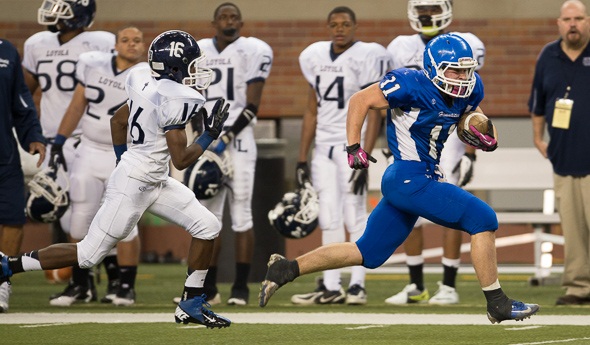
Ishpeming 'Makes Way' to MHSAA Title
November 24, 2012
By Geoff Kimmerly
Second Half editor
DETROIT – When Ishpeming coach Jeff Olson watched film this week of Saturday opponent Detroit Loyola, he saw a team that continuously “demoralized” its opponents.
By midway through the second quarter of the MHSAA Division 7 Final, his players understood what he meant.
Senior Brad Wootke, easily the Hematites’ biggest player, joked after about getting knocked around by the multiple more sizable Bulldogs across the line. Junior quarterback Alex Briones rolled his eyes into his head describing a blast he withstood.
But it would’ve taken more than that to knock Ishpeming off its path to an MHSAA football title. As Olson also explained, “They guys made their own way, and they made it all year.”
The Hematites doled out plenty of physicality and turned away a few late rushes to hang on to a 20-14 Division 7 championship win at Ford Field.
“First of all, we’re a hard-nosed football team. We don’t take anyone prisoners. We’re going to fight all we can,” Briones said. “They’re big, but we just didn’t let them dominate us.”
The championship was Ishpeming’s first since 1979, and came two seasons after the team fell 28-26 to Hudson in a 2010 Final. The Hematites finished this fall 13-1.
Loyola, 13-0 entering the day, was playing in its first MHSAA championship game and could be back again soon – the Bulldogs had only five seniors this fall.
But Loyola also was ranked No. 1 heading into these playoffs, featured the second-leading scorer in MHSAA single-season history in senior running back Keymonn’e Gabriel, and had eight players – to Ishepming’s one – weighing in between 250 and 290 pounds.
The No. 4-ranked Hematites were underdogs. And they knew it. But they obviously didn't believe it.
“Our coach he said it best before the game when we were at our school. He said the game’s going to be won or lost on the first smack, the first hit,” Gabriel said. “I guess we were just on the receiving end. We didn't come out strong like we were supposed to, and we just came up a little bit short.”
Although Loyola led at halftime, that advantage was slim – only 8-6. The Bulldogs had outgained the Hematites, but only 153-80. Seven minutes into the second half, Ishpeming appeared to change the tide with senior Eric Kostreva’s second touchdown run. But Loyola turned it back when Gabriel scored on a 20-yard run on the final play of the third quarter to make the score 14-12.
In the end, it would come down to a few close plays, all coming on fourth down. Ishpeming made good on both of its fourth-down attempts. Loyola was successful on four of five – but that one miss might have eventually been the decider.
Loyola faced fourth-and-seven with 7:47 to play and trailing 20-14, when Gabriel ran on a punt fake for 38 yards to Ishpeming’s 17-yard line. But four plays later, on fourth-and-one, Gabriel was hung up for no gain by the waiting Briones, who had senior R.J. Poirier right behind providing support.
Then it was Ishpeming’s turn to convert instead. Its first fourth-down make set up a third-quarter touchdown. That wasn't the case this time. But making good on a fourth-and-one try from its own 18 – after twice trying to draw Loyola off-side and calling two timeouts – allowed the Hematites to drain two more minutes off the clock before junior Tyler Windahl’s 44-yard punt pinned the Bulldogs on their 28 with 1:14 to play.
Loyola made one more first down, but ended the game on its 41-yard line.
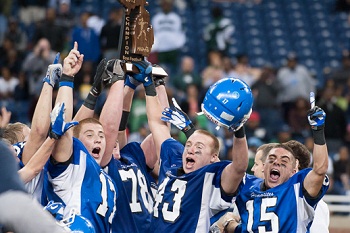 “I’m surprised I didn't want to go for it right off the bat. When we called timeout, I said we’re going to punt it, and I think half of you guys (his players) said, ‘Nope, we’re going for it,’” Olson said. “And when I thought about it, we always go for it on fourth and one. But if somebody offers me fourth and three inches for a state championship, I’m going for it.
“I’m surprised I didn't want to go for it right off the bat. When we called timeout, I said we’re going to punt it, and I think half of you guys (his players) said, ‘Nope, we’re going for it,’” Olson said. “And when I thought about it, we always go for it on fourth and one. But if somebody offers me fourth and three inches for a state championship, I’m going for it.
“We weren't going to punt it away and hope it happened. We wanted to make it happen.”
Gabriel finished with 21 carries for 129 yards and a touchdown rushing, and also caught four passes for 52 yards and a score. That gave him 326 points this season – second-most in MHSAA history, and final unofficial rushing numbers of 145 carries, 2,516 yards and 36 scores. The yards rank 20th in MHSAA history for one season, and the rushing touchdowns are 11th.
He did so running in part behind junior tackles Malik McDowell (6-foot-7, 290 pounds) and Kajohn Armstrong (6-5, 275), and Loyola certainly felt the impact Saturday when Armstrong had to leave the game early with an injury.
“Our seniors are the reason we’re here; they were our leaders although there were only five of them. But now it’s time for the other group to step up,” Loyola coach John Callahan said. “We had a lot of sophomores playing, a lot of freshman playing. I’m pretty sure I know what we did and what we didn't do, and we've got all offseason to work on and correct, and next season, to start over again.”
Kostreva ran 20 times for 182 yards and all three Ishpeming touchdowns, and also had 16 tackles. He’s one of 12 seniors who helped guide the program through a tough start to the fall after Olson’s son, Daniel, was found after committing suicide in July.
Jeff Olson said after this game wasn't about him, but Briones was quick to point out that the players certainly wanted to win in part for their coach and the memory of their former teammate.
“I didn't know how this year would go. But I know once I got on the football field, it was a relief for me,” Olson said. “It was where I really felt comfortable. It’s because of these guys right here. They made it comfortable for me.”
Click for full statistics and to watch a replay of the game. See below for the full press conference.
PHOTOS: (Top) Ishpeming running back Eric Kostreva (11) races down the sideline as Detroit Loyola's Anthony Frierson gives chase Saturday. (Middle) The Hematites celebrate their first MHSAA championship since 1979. (Click for more from Terry McNamara Photography.)
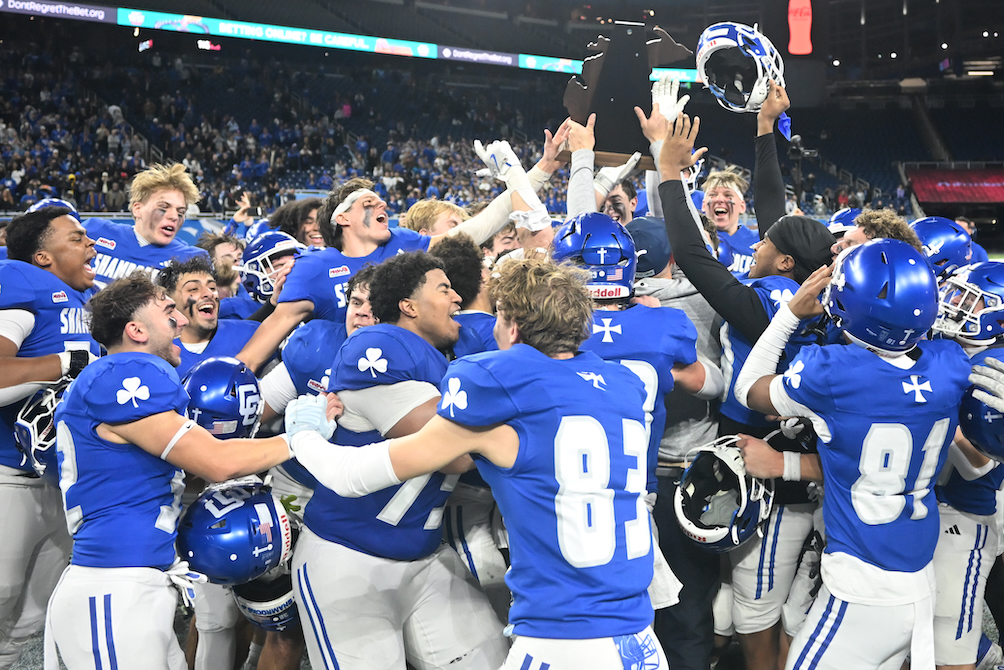
DCC Closes Season by Avenging 2024 Semifinal Loss to 'Finish What We Started'
By
Scott DeCamp
Special for MHSAA.com
December 1, 2025
DETROIT – The featured matchup of 2025 MHSAA Football Finals weekend at Ford Field pitted unbeaten heavyweights Detroit Catholic Central and Detroit Cass Tech in the Division 1 title bout.
DCC coach Justin Cessante used a boxing metaphor with his team in the days leading up to the main event. The Shamrocks essentially won by unanimous decision, although a knockout punch came from an unlikely source.
A 61-yard pick-6 by 6-foot-3, 300-pound senior noseguard Benny Eziuka with 3:12 remaining got the party started early and put the finishing touch on DCC’s dominant 42-19 victory over reigning champ Cass Tech to close Sunday night.
“We had a theme all week that our special teams and run game are going to be the body shots,” Cessante said. “Our uppercut is going to be making big plays on offense, and our defense – brick wall – was going to be the head shots.
“We talked about that all week and how we were going to play a physical, disciplined brand of football. I think we did that in all three phases.”
DCC did just that in capping a 14-0 season and capturing its first Finals title since 2009. The Shamrocks, who made their first championship game appearance since 2016, now have 11 wins in 18 trips to the final round.
Cass Tech (13-1) outgained DCC, 358-311, but the Shamrocks’ stingy defense forced multiple Technicians miscues, including two interceptions and a lost fumble.
Cass Tech suffered only its second Finals defeat in six overall trips to the championship game.
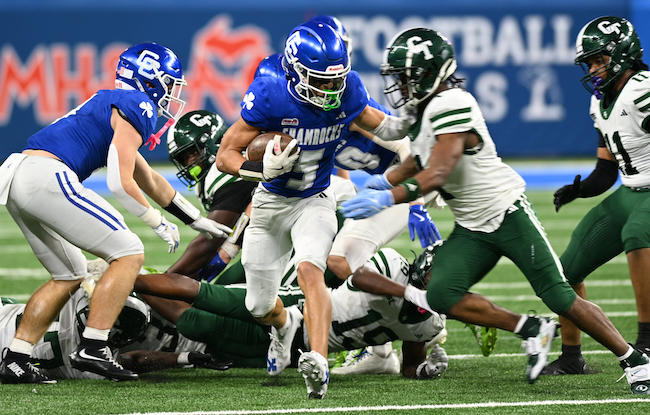 “We left a lot of stuff on the field,” Cass Tech coach Marvin Rushing said. “We’ll come back in a couple weeks and watch some of this stuff and we’ll be pounding the table a little bit with some of the stuff that we left on the field.
“We left a lot of stuff on the field,” Cass Tech coach Marvin Rushing said. “We’ll come back in a couple weeks and watch some of this stuff and we’ll be pounding the table a little bit with some of the stuff that we left on the field.
“To be a champion, you’ve got to beat the man to be the man today. They get to hoist the trophy, and they deserve it.”
DCC junior quarterback Duke Banta and classmate Gideon Gash connected on three touchdown passes: 41 yards with 7:44 left in the first quarter, 37 yards with 7:36 left in the third, and 48 yards with 4:52 remaining in the contest.
Banta finished 9-of-11 passing for 156 yards and no interceptions. All three of Gash’s receptions went for scores. Older brother, senior Samson Gash, had five receptions for 25 yards.
DCC senior Cedric Williams led all rushers with 72 yards on 18 carries with a one-yard TD midway through the fourth quarter. Senior Joshua Peters scored on a five-yard run to give the Shamrocks a 13-0 lead late in the first half, while junior kicker Ty Goddard booted a 21-yard field goal early in the fourth quarter for the champions.
It was Eziuka who stole the show, however. The two-way starting lineman and Penn State commit realized a big man’s dream. Junior linebacker Jalen Montlouis pressured Cass Tech’s backfield near the Technicians’ 45-yard line and forced a risky throw, which Eziuka caught at his own 39. Eziuka got a couple blocks, rumbled down the DCC sideline, and stomped into the end zone to the roar of the crowd.
“You know, I was just in the right place at the right time. I caught the ball, my teammate Connor Ryan was throwing me a block, so I was like, ‘I mean, he made the effort, so I’ve got to try to score,’” Eziuka said. “You know, I made the cut and saw green grass. I was like, ‘That’s a long way, but I’ve got to try.’ I kept going. I saw one of their guys catching up to me. My teammate, Jack Janda, made a great block for me to get in there.
“When I was in the end zone, I had to make my way to the barrier because I was not standing up for very long. (The barrier) was supporting me. I definitely needed oxygen,” Eziuka added with a chuckle. “It was a great play for the entire team.”
Samson Gash was asked if he felt threatened by Eziuka and a potential claim of being fastest player on the team.
“A little bit. Low key, a little bit,” Gash said to laughter in the interview room.
In addition to its interceptions, DCC’s defense sacked talented sophomore quarterback Donald Tabron II three times and limited Cass Tech to 73 rushing yards. Tabron finished 25-of-37 for 285 yards with two TDs – one to senior Corey Sadler Jr. from 15 yards out with 5:24 left, and the other to senior William Sykes Jr. from 12 yards out with 14 seconds remaining.
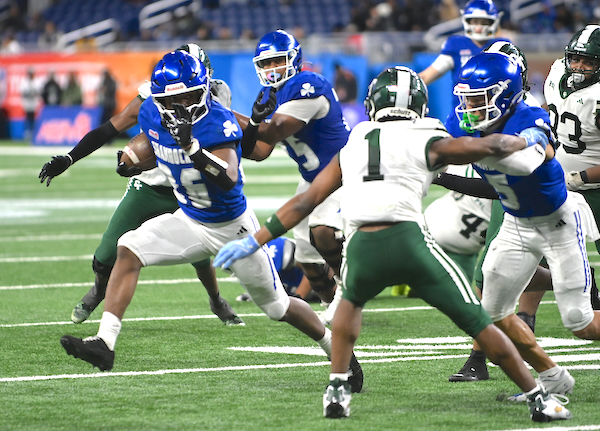 Sadler, a North Carolina commit, wrapped up his storied four-year varsity career with 11 receptions for 130 yards and made a co-team-high seven tackles.
Sadler, a North Carolina commit, wrapped up his storied four-year varsity career with 11 receptions for 130 yards and made a co-team-high seven tackles.
“The four years have been great,” Sadler said. “I’m probably one of the best players to come through Detroit in the PSL league, so … it was a sad outcome today. You know, college is next. I just have to keep my head high. We fought. CC had a great game.”
Senior Justin Bonner also made seven stops for Cass Tech. For DCC, Montlouis led the way with eight tackles.
Sunday’s victory also represented a measure of revenge for DCC, which fell to Cass Tech in last year’s Semifinals, 17-14.
In the 2016 Final, the Shamrocks fell to the Technicians, 49-20.
“It’s a tremendous feeling,” said Cessante, who capped his fourth year leading DCC’s program. “Other than being married and my children, bringing a championship back to my alma mater, Detroit Catholic Central, where this championship belongs, obviously against a team (where) we just had enough over the years in regards to the rivalry that’s been built and them being really a nemesis and us getting over the hump and finishing what we started (is special).”
The Gash brothers have been double trouble for DCC opponents.
While it was Gideon’s turn to shine Sunday, the siblings reflected on what it means to share in the Shamrocks’ long-awaited championship and how special it was to share in it.
“It means everything to us. After we lost last year to Cass Tech, we knew we should have beat them. But like Coach Cessante said, we didn’t prove it,” Samson Gash said. “Our motto this year was, ‘Finish what we started.’
“Our seniors did a great job last year, and we needed to bring a state championship for this year and just working every single day with my brothers, my best friends for life, it means everything to us to go out on top, for sure.”
PHOTOS (Top) Detroit Catholic Central players celebrate Sunday while hoisting their championship trophy. (Middle) The Shamrocks’ Samson Gash (5) attempts to put space between himself and a Cass Tech defender. (Below) Cedric Williams (26) picks his path as Gash blocks in front of him.

